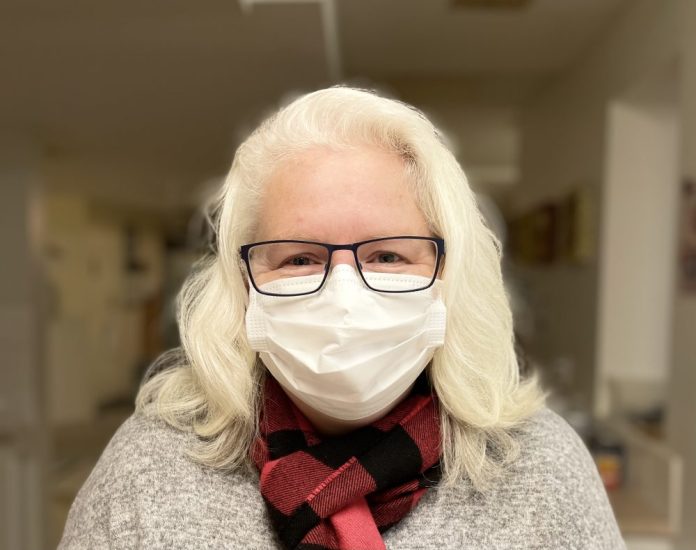Submitted by Cornerstone Housing for Women
I walk into one of our four supportive housing residences for women wearing my surgical grade mask, I sanitize my hands and go right to our staff area to get ready for my day. We no longer have volunteers to help in our programs, we’ve had to close off common spaces, and staff are now cooking all meals for the residents. Staff put on their goggles on, mask, gloves, and gown to serve breakfast. The women line up with masks on, stand two meters apart, and they’re silent while waiting to get their food.
There’s a coldness and emptiness to our programming — something you never saw before the pandemic.
I work for Cornerstone Housing for Women, which is the largest organization providing around-the-clock shelter services to adult women experiencing homelessness and permanent, stable housing for adult women. We pride our work on giving a dignified and compassionate space for women to heal and get essential supports.
I miss the day where I would come into work connect with the women, see them sitting together without COVID-19 restrictions. But I have to stay motivated and have hope not only for them, but also for myself and my family. It has taken a toll on everyone’s mental wellbeing. I do my best to support the women in a welcoming and compassionate environment regardless of the pandemic.
However, COVID-19 protocols have pushed us to places of incongruences and ethical dilemmas.
Pre-pandemic, we would not think to put more than two women in one room at our shelter; we believe in providing dignified spaces for women. But COVID-19 and the stay-at-home orders have left Cornerstone needing to open more beds at our emergency shelter. We worked collaboratively with Ottawa Public Health, the City of Ottawa and Shepherds of Good Hope to move our shelter and increase our capacity. We moved from supporting 61 women to 125 in a matter of months. Some rooms now house four to five women. Although each bed in a room has been measured to be physically distant, all of the women, complete strangers have to stay in the same room, each of whom have their challenges, diagnoses and trauma. We’ve had to re-evaluate our stance on what dignified housing and shelter means, as the alternative is much worse, and dangerous.
There has also been a rise in domestic violence against women. A survey sent out in the summer of 2020 by Ending Violence Association of Canada and London, Ontario confirms this increase with their survey to staff and volunteers as transition houses, shelters, immigration centers, and other social agencies coast-to-coast.
Cornerstone staff continues to see a rise for women-only spaces. Our fear is for women fleeing domestic violence in need of emergency shelter and not having a place to stay, or they can’t access services because they are home with their abusers. There’s also the concern of staying in a shelter with strangers during this pandemic.
Pre-COVID-19 Ottawa women’s shelters were only able to support about 70 per cent of women in need of a shelter. You add a pandemic on top of the limited spaces for women, we’re now trying to navigate four crises at once: a housing crisis, an opioid crisis, a pandemic and gender-based violence crisis. We all deserve to be housed with respect and dignity.
Unfortunately, this has been the reality for over a year and continues to look like our future. But this situation is not without hope.
We will continue to work tirelessly on the frontlines of the pandemic to help vulnerable women in our community get through this difficult time, but we need our community’s support.
For International Women’s Day, we #choosetochallenge our community to work towards systemic changes that address the root of gender-based violence. We urge our elected officials to push for more affordable housing in our city. We need community movements that prompt compassion and end stigma around experiencing homelessness so people can access the supports they need.
A more inclusive and supportive community for all begins in our communities. We all deserve the right to dignified, stable housing.
Nicola Dunn is the Program Manager of Cornerstone’s MacLaren Residence. Nicola has worked at Cornerstone for 27 years having worked on the frontlines, was the manager of our women’s shelter and now the Program Manager of our MacLaren Residence. Nicola is passionate about providing permanent, affordable, and supportive housing for women who are vulnerable in our city without judgement.
Editor’s Note: Cornerstone Housing for Women has supportive housing communities across the city, including one on Princeton Avenue in Westboro. To learn more, visit cornerstonewomen.ca.
